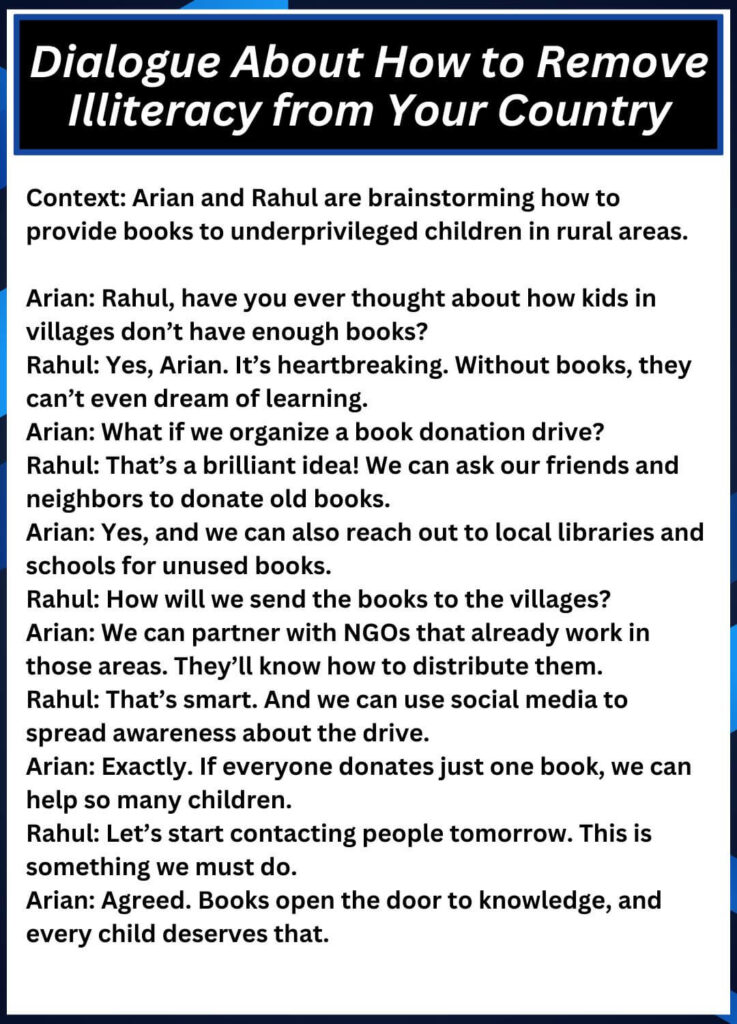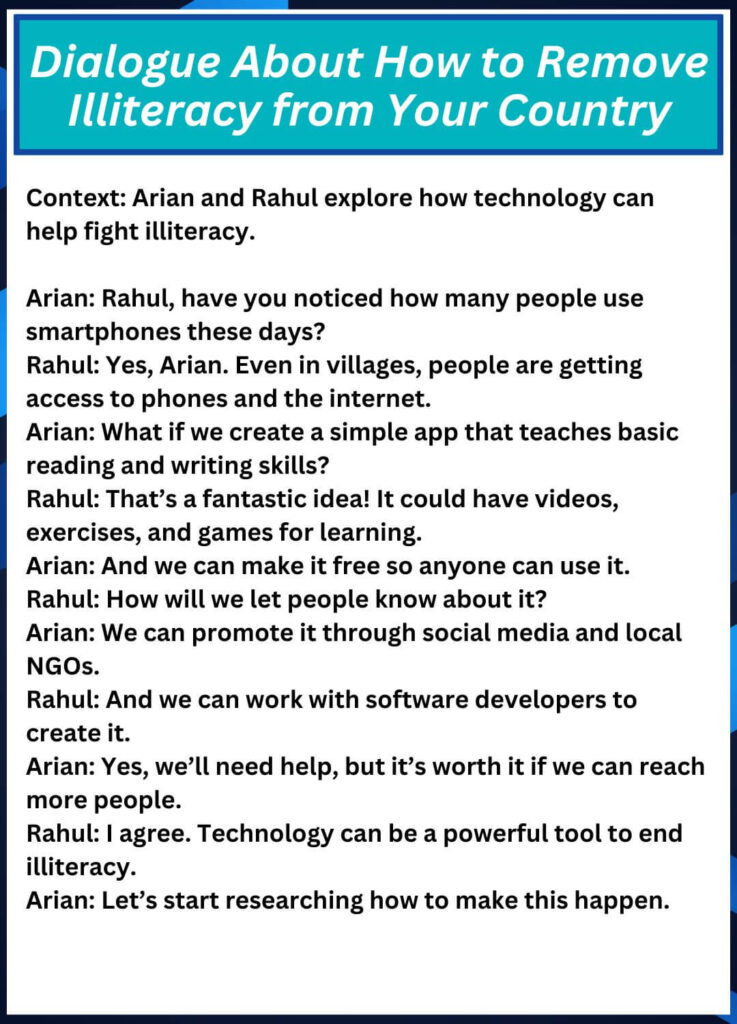Sample 1: Dialogue About How to Remove Illiteracy from Your Country
Context: Arian and Rahul are discussing how to help people in their neighborhood learn to read and write.
Arian: Rahul, have you noticed how many people in our neighborhood struggle to read signs and newspapers?
Rahul: Yes, Arian. It’s a serious issue. We need to do something about it.
Arian: I was thinking, What if we started free literacy classes in the community center?
Rahul: That sounds great, but how will we get teachers?
Arian: We could volunteer ourselves, and maybe we can ask our friends to help too.
Rahul: That’s a good idea. We can also ask the local school teachers to guide us.
Arian: True. We can provide basic reading and writing lessons for adults and children.
Rahul: And we can use simple materials, like storybooks and flashcards, to make it easy.
Arian: Exactly. We’ll also spread the word by putting up posters around the neighborhood.
Rahul: Let’s start planning it this weekend. I’m sure we’ll make a difference.
Arian: Agreed. Together, we can help reduce illiteracy step by step.
Sample 2: Dialogue About How to Remove Illiteracy from Your Country
Context: Arian and Rahul are brainstorming how to provide books to underprivileged children in rural areas.
Arian: Rahul, have you ever thought about how kids in villages don’t have enough books?
Rahul: Yes, Arian. It’s heartbreaking. Without books, they can’t even dream of learning.
Arian: What if we organize a book donation drive?
Rahul: That’s a brilliant idea! We can ask our friends and neighbors to donate old books.
Arian: Yes, and we can also reach out to local libraries and schools for unused books.
Rahul: How will we send the books to the villages?
Arian: We can partner with NGOs that already work in those areas. They’ll know how to distribute them.
Rahul: That’s smart. And we can use social media to spread awareness about the drive.
Arian: Exactly. If everyone donates just one book, we can help so many children.
Rahul: Let’s start contacting people tomorrow. This is something we must do.
Arian: Agreed. Books open the door to knowledge, and every child deserves that.
Dialogue About How to Remove Illiteracy from Your Country
Sample 3: Dialogue About How to Remove Illiteracy from Your Country
Context: Arian and Rahul discuss how awareness campaigns can encourage people to prioritize education.
Rahul: Arian, why do you think so many people don’t send their kids to school?
Arian: I think it’s partly because they don’t understand how important education is.
Rahul: You’re right. We need to raise awareness about why learning matters.
Arian: What if we organize an education awareness campaign?
Rahul: That’s a good idea. How would we do it?
Arian: We could hold small events in villages and show videos about the benefits of education.
Rahul: Yes, and we can invite local leaders to encourage people to join.
Arian: We can also share real-life success stories to inspire them.
Rahul: That will make a big impact. Let’s also print flyers in simple language to hand out.
Arian: Great idea. If we work together, we can spread this message far and wide.
Rahul: Absolutely. Awareness is the first step to ending illiteracy.
Sample 4: Dialogue About How to Remove Illiteracy from Your Country
Context: Arian and Rahul are discussing how to get the government involved in solving illiteracy.
Arian: Rahul, do you think the government is doing enough to fight illiteracy?
Rahul: Not really. There are programs, but they don’t reach everyone.
Arian: What if we write a petition asking for better resources for schools?
Rahul: That’s a great idea. We can collect signatures from our community to support it.
Arian: Yes, and we can suggest ideas like free evening classes for working adults.
Rahul: The government could also provide scholarships for children from poor families.
Arian: Exactly. And we can request more trained teachers in rural areas.
Rahul: Let’s draft the petition this week. We’ll make sure it reaches the right people.
Arian: Together we can push for real change through this effort.
Rahul: Yes, Arian. Every voice counts when it comes to such an important cause.
Sample 5: Dialogue About How to Remove Illiteracy from Your Country
Context: Arian and Rahul explore how technology can help fight illiteracy.
Arian: Rahul, have you noticed how many people use smartphones these days?
Rahul: Yes, Arian. Even in villages, people are getting access to phones and the internet.
Arian: What if we create a simple app that teaches basic reading and writing skills?
Rahul: That’s a fantastic idea! It could have videos, exercises, and games for learning.
Arian: And we can make it free so anyone can use it.
Rahul: How will we let people know about it?
Arian: We can promote it through social media and local NGOs.
Rahul: And we can work with software developers to create it.
Arian: Yes, we’ll need help, but it’s worth it if we can reach more people.
Rahul: I agree. Technology can be a powerful tool to end illiteracy.
Arian: Let’s start researching how to make this happen.
Dialogue About How to Remove Illiteracy from Your Country
FAQs on Dialogue About How to Remove Illiteracy from Your Country
1. Why is fighting illiteracy important?
Fighting illiteracy is essential because it empowers people to improve their lives, find better jobs and contribute to the growth of their communities and the nation.
2. How can individuals contribute to reducing illiteracy?
Individuals can volunteer to teach, donate books, organize awareness campaigns, or use technology to make learning accessible to everyone.
3. What role can technology play in removing illiteracy?
Technology can provide educational resources, apps, and online courses, making learning affordable and accessible, even in remote areas.

